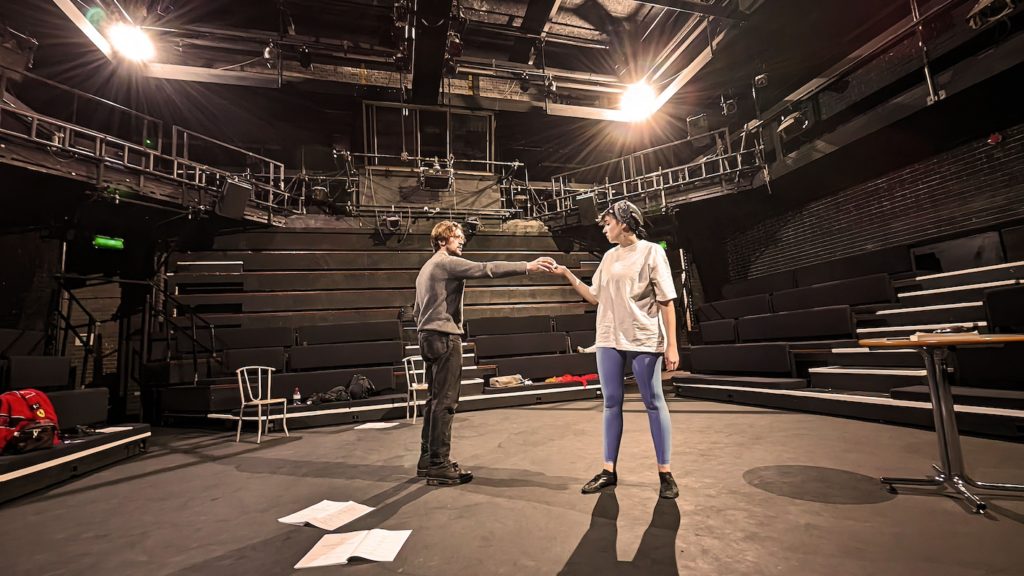Jupiter’s Ghost – Tani Gill Dance Company / The Cockpit Theatre, London
Tani Gill’s Jupiter’s Ghost fuses theatre and dance to explore what makes us human.

Jupiter’s Ghost
It’s not uncommon to hear of parents who would do anything for their child. But what if the ‘anything’ within your power was a little… out of the ordinary? Such is one of the questions posed by Jupiter’s Ghost, which had an outing at London’s Cockpit Theatre over the weekend.
Enter Elias Cretè. In a post-apocalyptic, classical mythology-referencing world, he and his son Jove are on a spaceship. Where are they going? Not sure. Earth is now uninhabitable, so not there. At only 65 minutes run time it’s not possible to explain all the details so to some extent you just have to go with it.
So there’s Elias (Conor Pavitt). There’s Jove (Jack Chambers). There’s CAII (Madison Lazarus), who seems to be the type of humanoid assistant who pops up in many a futuristic world. She certainly helps fill in a few details in short order. Then there’s Jupiter (Olivia J. Night). Or Jupiter 101 more precisely: seemingly the 101st of something. But what? Could it have to do with Elias’s obvious anxiety and Jove’s seemingly failing health? The sense that we’re almost out of time?
Jupiter’s Ghost actually reminded me of the version of The Cherry Orchard I saw at the Yard Theatre some time ago now. Firstly in the way that humans in space highlights our ultimate fragility and vulnerability. And also in eschewing the Western cultural default for post-apocalyptic space dramas in favour of something with more South Asian influence. In this instance this is less obviously in Tani Gill’s writing, and more in touches like Neel Murgai’s sitar-forward composition.
What of the story? Well, although the run at the Cockpit Theatre is over, I imagine that the team behind Jupiter’s Ghost see it as an ongoing project. I will therefore avoid too many spoilers. But, we do at least come to understand that Elias is fighting a ticking clock to save his son. He is a scientist skilled in AI and cloning techniques, which opens up avenues of enquiry. Philosophers would perceive more, including the preservation/transfer of intelligence and what makes us human. Does he succeed in saving his son? You’ll have to hope for a future run in order to find out.
Short Running Times: Not Always Optimal?
Last week we were talking about a convergence of work about identity and self-discovery. This week’s theme is more prosaic: that the Salterton Arts Review is seemingly never satisfied with the length of anything. As I mentioned above, 65 minutes is very ambitious for world-building. As a result I found myself confused on a few occasions, unsure whether to read something into a line or whether it was part of a deception. I gave up after a while and decided it was more about the idea and the execution than the detail.
And there is a lot to like about the idea and the execution. As much as Elias wishes to dehumanise the results of his experimentation, for instance (which is one of the things I couldn’t quite understand), they forge an emotional connection directly with the audience through dance. It’s rather a clever way to bypass language and some of those unanswered questions. Lola Kinard is the lead dancer, with Night as Jupiter also telling their story physically.
I also liked the simplicity of the set (Tom Trevor-Roberts) and costumes (Marta San Giovanni). The costumes contain a nod to the future/classical duality inherent in the text. And the set is restrained, with just enough so we can picture a spaceship and fill in the rest ourselves.
Another downside to the short running time is that there isn’t much space for character development, although I don’t think all the characters could have developed anyway without dispelling some of the aura of mystery. I would have liked to see more variety in the direction, too, although I will give credit for the good use of the space. The Cockpit, for those who don’t know it, is in the round. When it was built in the 1970s it was the first purpose-built theatre in the round in London since Shakespeare’s time. The other theme of the week is how much better funded the arts have been in the past.
But I digress. To get back to Jupiter’s Ghost, I think it’s an ambitious bit of storytelling and theatre-making. Not everything hits the mark, but it perhaps would be a less interesting work if it did.
Salterton Arts Review’s rating: 3/5
Jupiter’s Ghost was on at the Cockpit Theatre on 22 and 23 June only. Check here for any future listings.
Trending
If you see this after your page is loaded completely, leafletJS files are missing.

